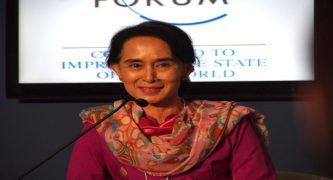
From Voice Of America
Aung San Suu Kyi is unlikely to win any big changes to Myanmar’s military-drafted constitution, despite launching her boldest challenge yet to the generals’ entrenched role in politics, analysts have said.
Her civilian National League for Democracy (NLD) party, which dominates parliament, last week comfortably won a vote to set up a committee to amend the charter— but observers say that’s about as easy as it’s going to get.
Amending the constitution
The roughly 200-page document guarantees soldiers a quarter of all seats in parliament, giving them the ability to veto any constitutional changes, which require 75 percent of the vote to pass.
That means the NLD’s super majority from a landslide 2015 election win is effectively useless when it comes to striking down clauses that bar Suu Kyi from becoming president and allow the military to control key ministries.
The constitution came into force following what is regarded as a sham referendum in 2008, held just a few days after a devastating cyclone killed around 140,000 people.
The death of Ko Ni
Hopes of reform dampened after the assassination in early 2017 of Ko Ni, a top constitutional lawyer and close advisor to Suu Kyi.
The NLD appeared to be signaling those hopes were still alive when it used the second anniversary of Ko Ni’s death to announce its plan to form the committee last month.
Power of the military
Making the charter more democratic was a key NLD election pledge, but the committee appears to be less about making good on that promise than trying to show voters that they tried, and were hamstrung by the generals.
“They already know very well that if they cannot get the military to agree, they cannot change the constitution,” said Ye Myo Hein, an analyst with the Tagaung Institute of Political Studies, a Yangon-based think-tank.
With the next election in 2020 looming ever larger, he added, “they want to send the message to the people that the NLD is always trying to fulfill its campaign promises.”
But using the military’s legal veto as an excuse for failure might ring hollow, said Soe Myint Aung, founder of the Yangon Centre for Independent Research.
Changing the charter would require an imaginative political solution to win concessions from the generals, he added; simply suggesting changes they are bound to vote down won’t be enough.
“I don’t think the NLD is really in a position to put the blame on the military if the amendments do not happen,” he said. “The constitutional amendment question is really about political will. It’s not really about the legal matter.”
The NLD has tried to harness popular support to amend the constitution before, but that was before they came to power.
Mandalay demonstrations
And while hundreds of demonstrators rallied this week in the city of Mandalay to support changes, drawing on the power of the public to pressure the generals may not be the best strategy for the NLD this time, said Ye Myo Hein.
“In the near future they will be very busy with the election. I think it is very risky and also they would have to invest a lot of time and energy to mobilize,” he said.
While key clauses that preserve the military’s power are off limits for now, there are some less significant changes that the NLD may be able to make ahead of the next general election to show it has made progress.
Some change possible
Scrapping section 261, which gives the president a key role in appointing regional chief ministers, is plausible because the military would not see that as a threat, says Ye Myo Hein.
“They will allow constitutional reform that cannot damage their role in politics,” he said.
Decentralizing some power to Myanmar’s conflict-torn borderlands in this way might even serve the military’s interests, he added, allowing them “to pressure ethnic armed groups to participate in politics rather than taking up arms.”
The question is whether or not the NLD itself would want such a change; the party has been accused of using the clause to get the upper hand while in power.
The committee could be seen as an opportunity for Aung San Suu Kyi to win back some of the trust she has lost amid criticism she is unwilling to negotiate with ethnic parties.
Rather than using it to try to push through the changes they already want, the government should open a wider dialogue, said Melissa Crouch, an expert on Myanmar constitutional law.
“I think there’s a lot the NLD could do around transparency and public participation in this process,” she said.
That will be a precarious path to tread, said Soe Myint Aung: “The worry is that the NLD will not be able to please anyone, and this will just be seen as a political ploy.”
Leave a Reply